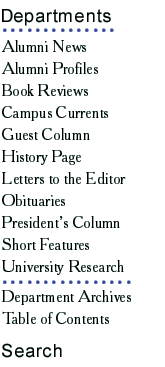

|
 Photo by Philippe Merle 
|
'Students Just Like Us' By Jake Chapline On Feb. 19, 1942, President Franklin Roosevelt issued Executive Order 9066, authorizing the U.S. military to detain some 120,000 persons of Japanese ancestry living on the West Coast. Most of them were U.S. citizens by birth, and half were children. They were incarcerated in camps in the Midwest, surrounded by barbed wire and armed guards. Many were held in the camps for the next three years, and some died there. Roosevelt himself called the relocation centers "concentration camps." The impact of the executive order seemed far removed from the University of New Hampshire, where few students had ever met anyone of Japanese ancestry. "I might have bumbled through my college days completely unaware of what was going on, had I not been a member of the Student Christian Association," recalls Judy Austin Rantala '44. The SCA learned of the plight of the detainees from the National Japanese American Student Relocation Council, a Quaker organization that was trying to get students out of the camps and into colleges in the Midwest or the East. Rantala, the SCA's president at the time, says that her group was not inclined to help at first. "Many in the group were totally opposed to the idea," she remembers. "They said it would be aiding the enemy to support a Japanese when our men were fighting them. That they were talking about American citizens--students just like us who were yanked out of the classroom--didn't sink in right away."
Still, after much discussion and soul-searching, the SCA decided to go to the UNH administration with a request to sponsor a student from a camp. "The administration told us that before any such student could come to UNH, every single organized campus group had to meet and agree to accept the student and to guarantee that there would be no harassment, no campus incidents," Rantala says. It was a daunting condition, but the SCA resolved to go ahead. "We started down the list, scheduling meetings with each group," Rantala says. "To our considerable surprise, although there was a lot of foot-dragging when we tried to get groups to meet with us, every one of them voted to support our effort." The process took months, and the students who spearheaded the campaign paid a price. "I was almost totally ostracized by my sorority sisters, many of whom would hurl epithets such as 'Jap lover' at me as we passed on the stairs," Rantala remembers. "I had not anticipated such animosity." It was late in the spring of 1943 before the last group on campus, a fraternity, agreed to go along with the SCA proposal. Rantala was jubilant as she slogged through the rain the next day to tell Registrar Everett Sackett that the administration's conditions had been met. "Now all we have to do is get a Japanese-American student here," she told him. "Not so fast," Sackett replied. "Your student will have to go to the bottom of the waiting list, just like any other new applicant." (In fact, Sackett had already informed the National Japanese American Student Relocation Council that the university had no intention of accepting a student detainee, but Rantala did not know that.) Rantala was stunned. "I was so angry, so upset, I could have sat down and cried," she says. Instead, still dripping wet, she stomped over to President Fred Englehart's office and demanded to talk to him. Minutes later she was seated across from the president, pouring out her story. Englehart told her he would look into the matter and be in touch. A few weeks later, just before the semester ended, Rantala was informed that a Japanese-American student would be admitted the following year. Because she finished her course work over the summer, however, Rantala was not on hand in the fall of 1943 to greet Toshiko Baba Yoneji '44, the first of three students to attend UNH through the relocation program. According to Yoneji, who now lives in Minnesota, the students at UNH were as good as their word: she never experienced harassment of any kind on campus. "I have nothing but pleasant memories of my year in Durham," she says. "I made some lifelong friends there, and I still see them from time to time." Rantala went on to earn a master's degree from Yale Divinity School. She devoted many years to religious education at the University of Chicago and the University of Washington and with the YWCA in Hawaii, where she lives today. Her long campaign to free at least a few Japanese-American detainees was a turning point in her life, she says. "It showed me the power of individual action in the face of seemingly overwhelming odds." ~ blog comments powered by DisqusCurrent issue | Past issues | Class notes Department archives | Send a letter/news | Address updates Advertise | About UNH Magazine | Alumni home | UNH home University of New Hampshire Alumni Association 9 Edgewood Road Durham NH 03824 (603) 862-2040 alumni@unh.edu |